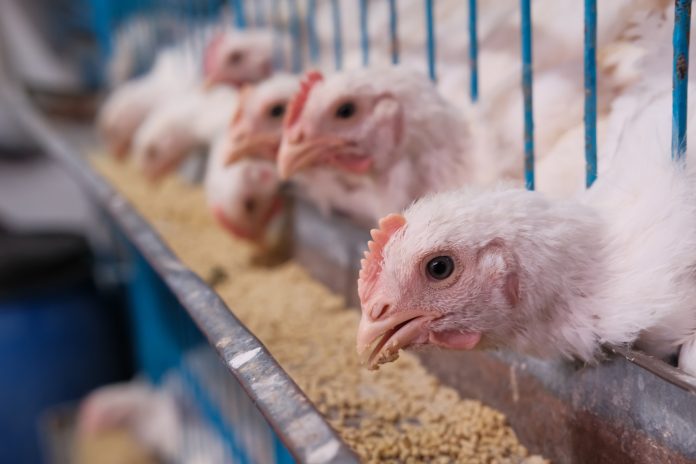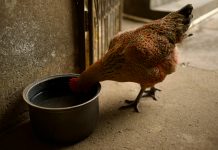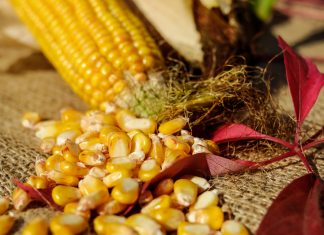As a homesteader, farmer, or gardener, you already know the importance of healthy animals for a self-sustaining farm. When we feed our animals appropriately balanced meals with proper nutrition, they live healthier and more productive lives – which ultimately means better yields from production systems like dairy cows or laying hens.
But what if there was an even better way to provide your livestock with nutrition that took things one step further? Peptide-infused animal feed is emerging as a promising solution for improving health and productivity in farmed animals while simultaneously saving money and resources.
In this blog post, we’ll explore how peptides are being used to take animal nourishment to the next level in sustainable farming operations.
Introducing Peptide-Infused Animal Feed
As the market for high-quality animal feed continues to grow, many producers are turning to innovative solutions to provide their livestock with optimal nutrition.
One of the most exciting recent developments in this field is peptide-infused animal feed, which contains highly bioavailable protein fragments that can be easily digested by animals. By incorporating these peptides into feed formulations, producers can improve animal growth rates, enhance immune function, and boost overall health and well-being.
With its numerous benefits and wide range of potential applications, peptide-infused animal feed is an exciting development that is sure to play an increasingly important role in the future of animal agriculture.
Understanding How Peptides Help Enhance Nutrition in Animal Feeds
Peptides are a key ingredient in animal feeds as they play a crucial role in enhancing nutrition for livestock. Peptides are essentially chains of amino acids that are easily absorbed by the animal’s digestive system, leading to more efficient utilization of nutrients from feed.
Through their role as building blocks for protein synthesis, peptides are crucial in muscle growth and development as well as overall metabolism regulation. They can also be used to improve animal health, as some peptides possess antibacterial and antiviral properties.
The benefits of incorporating peptides into animal feed are many, from improved feed conversion and growth rates to higher-quality end products. As the demand for high-quality animal protein continues to rise, understanding the essential role of peptides in animal nutrition is key to sustainable and efficient farming practices.
The Benefits of Peptide-Infused Animal Feed for Self-Sustaining Farms
Self-sustaining farms have been gaining popularity as consumers become increasingly aware of the environmental impact of conventional agriculture. One technique that has been gaining traction among farmers is the use of peptide-infused animal feed.
Peptides are naturally occurring compounds that play important roles in many biological processes. When included in animal diets, they have been shown to improve growth rates and overall health. Additionally, a diet consisting of peptide-infused feed can reduce the environmental impact of farming by decreasing the waste produced by animals.
By implementing this type of feed into their operation, self-sustaining farmers can provide their livestock with optimal nutrition while also minimizing their carbon footprint.
Enhancing Nutritional Value with Peptides
As we continue to learn more about nutrition and the role it plays in our overall health, there is growing interest in the potential of peptides to enhance the nutritional value of our food.
Peptides are short chains of amino acids that can be found naturally in many foods, including milk, meat, and fish. Some studies have suggested that peptides may offer a range of health benefits, including improved digestion, immune system function, and blood pressure control.
By adding specific peptides to certain food products, it may be possible to increase their nutritional value and potentially provide additional health benefits to consumers. As researchers continue to explore the potential of these naturally occurring compounds, it’s an exciting time for the field of nutrition.
Also, when considering the health and nutrition of livestock, particularly in sustainable farming practices, seeking expert advice from veterinarians is always a good idea. Programs like the Dairy Residency for Veterinarians are specifically designed to give vets specialized experience in dairy herd management, ensuring that livestock on farms are receiving optimal care. This is especially important when introducing new feeding techniques, such as peptide-infused animal feed, which offers advanced nutrition solutions.
Factors to Consider Before Incorporating Peptides into Livestock’s Diet
Before incorporating peptides into livestock’s diet, it’s important to consider several key factors to ensure the health and well-being of the animals. One important consideration is the quality and source of the peptides.
Are they derived from natural sources, or are they synthetic? Another important factor is the dosage and frequency of administration. It’s crucial to ensure that the animals are receiving the right amount of peptides and that they are being administered at the appropriate intervals.
Additionally, it’s important to consider any potential adverse effects and to monitor the animals closely for any signs of discomfort or illness.
By considering these factors, livestock owners can make informed decisions about incorporating peptides into their animals’ diets, promoting both the animals’ health and the quality of the final product.
Tips for Successfully Including Peptides into Livestock Feeds
Including peptides in livestock, feeds requires careful planning and attention to detail. The first tip for successfully incorporating these proteins into your animals’ diets is to choose high-quality peptides that are specifically tailored to their needs. It’s also important to consider the dosage and frequency of feeding, as well as the impact of other nutrients in the feed.
Additionally, it’s crucial to maintain proper hygiene and storage conditions to ensure the purity and effectiveness of the peptides. By implementing these tips and staying attuned to your animal’s nutritional requirements, you can maximize the benefits of peptide supplementation and help promote their overall health and well-being.
In summary, introducing peptide-infused animal feed can drastically increase the nutrition and health of your livestock. This could be a great way for small farmers to maintain their sustainability instead of relying on expensive supplements. Not only can peptides provide essential nutrients and vitamins, but they can also improve digestion and absorption because of their high bioavailability. Additionally, there are several factors to consider before deciding if peptides are the best choice for your livestock feed. Knowing the fine details such as dosage, protection methods if applicable, storage needs, etc., will help you more confidently implement these feeds into your farm’s routine diet. Lastly, it’s always helpful to properly research reputable sources and consult a veterinarian when in doubt. The peptide-infused animal feed may just be the solution your farm has been waiting for!
As a homesteader, farmer, or gardener, you already know the importance of healthy animals for a self-sustaining farm. When we feed our animals appropriately balanced meals with proper nutrition, they live healthier and more productive lives – which ultimately means better yields from production systems like dairy cows or laying hens.
But what if there was an even better way to provide your livestock with nutrition that took things one step further? Peptide-infused animal feed is emerging as a promising solution for improving health and productivity in farmed animals while simultaneously saving money and resources.
In this blog post, we’ll explore how peptides are being used to take animal nourishment to the next level in sustainable farming operations.
Introducing Peptide-Infused Animal Feed
As the market for high-quality animal feed continues to grow, many producers are turning to innovative solutions to provide their livestock with optimal nutrition.
One of the most exciting recent developments in this field is peptide-infused animal feed, which contains highly bioavailable protein fragments that can be easily digested by animals. By incorporating these peptides into feed formulations, producers can improve animal growth rates, enhance immune function, and boost overall health and well-being.
With its numerous benefits and wide range of potential applications, peptide-infused animal feed is an exciting development that is sure to play an increasingly important role in the future of animal agriculture.
Understanding How Peptides Help Enhance Nutrition in Animal Feeds
Peptides are a key ingredient in animal feeds as they play a crucial role in enhancing nutrition for livestock. Peptides are essentially chains of amino acids that are easily absorbed by the animal’s digestive system, leading to more efficient utilization of nutrients from feed.
Through their role as building blocks for protein synthesis, peptides are crucial in muscle growth and development as well as overall metabolism regulation. They can also be used to improve animal health, as some peptides possess antibacterial and antiviral properties.
The benefits of incorporating peptides into animal feed are many, from improved feed conversion and growth rates to higher-quality end products. As the demand for high-quality animal protein continues to rise, understanding the essential role of peptides in animal nutrition is key to sustainable and efficient farming practices.
The Benefits of Peptide-Infused Animal Feed for Self-Sustaining Farms
Self-sustaining farms have been gaining popularity as consumers become increasingly aware of the environmental impact of conventional agriculture. One technique that has been gaining traction among farmers is the use of peptide-infused animal feed.
Peptides are naturally occurring compounds that play important roles in many biological processes. When included in animal diets, they have been shown to improve growth rates and overall health. Additionally, a diet consisting of peptide-infused feed can reduce the environmental impact of farming by decreasing the waste produced by animals.
By implementing this type of feed into their operation, self-sustaining farmers can provide their livestock with optimal nutrition while also minimizing their carbon footprint.
Enhancing Nutritional Value with Peptides
As we continue to learn more about nutrition and the role it plays in our overall health, there is growing interest in the potential of peptides to enhance the nutritional value of our food.
Peptides are short chains of amino acids that can be found naturally in many foods, including milk, meat, and fish. Some studies have suggested that peptides may offer a range of health benefits, including improved digestion, immune system function, and blood pressure control.
By adding specific peptides to certain food products, it may be possible to increase their nutritional value and potentially provide additional health benefits to consumers. As researchers continue to explore the potential of these naturally occurring compounds, it’s an exciting time for the field of nutrition.
Factors to Consider Before Incorporating Peptides into Livestock’s Diet
Before incorporating peptides into livestock’s diet, it’s important to consider several key factors to ensure the health and well-being of the animals. One important consideration is the quality and source of the peptides.
Are they derived from natural sources, or are they synthetic? Another important factor is the dosage and frequency of administration. It’s crucial to ensure that the animals are receiving the right amount of peptides and that they are being administered at the appropriate intervals.
Additionally, it’s important to consider any potential adverse effects and to monitor the animals closely for any signs of discomfort or illness.
By considering these factors, livestock owners can make informed decisions about incorporating peptides into their animals’ diets, promoting both the animals’ health and the quality of the final product.
Tips for Successfully Including Peptides into Livestock Feeds
Including peptides in livestock, feeds requires careful planning and attention to detail. The first tip for successfully incorporating these proteins into your animals’ diets is to choose high-quality peptides that are specifically tailored to their needs. It’s also important to consider the dosage and frequency of feeding, as well as the impact of other nutrients in the feed.
Additionally, it’s crucial to maintain proper hygiene and storage conditions to ensure the purity and effectiveness of the peptides. By implementing these tips and staying attuned to your animal’s nutritional requirements, you can maximize the benefits of peptide supplementation and help promote their overall health and well-being.
In summary, introducing peptide-infused animal feed can drastically increase the nutrition and health of your livestock. This could be a great way for small farmers to maintain their sustainability instead of relying on expensive supplements. Not only can peptides provide essential nutrients and vitamins, but they can also improve digestion and absorption because of their high bioavailability. Additionally, there are several factors to consider before deciding if peptides are the best choice for your livestock feed. Knowing the fine details such as dosage, protection methods if applicable, storage needs, etc., will help you more confidently implement these feeds into your farm’s routine diet. Lastly, it’s always helpful to properly research reputable sources and consult a veterinarian when in doubt. The peptide-infused animal feed may just be the solution your farm has been waiting for!














